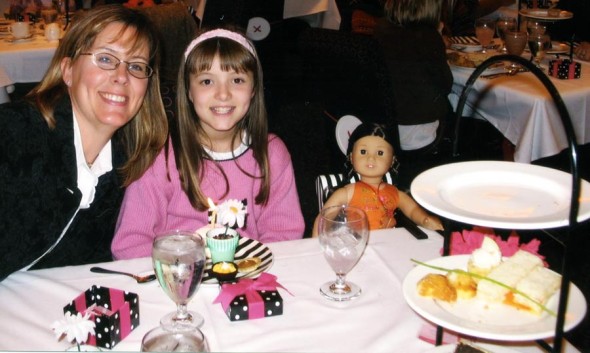
Sandy and Danielle Pattison enjoy a mother-daughter lunch on a trip to Chicago a few years ago.
Setting limits, seeking independence, experiencing warmth and conflict: exploring a complex relationship
*Knock knock*
“Juanita!”
*Knock knock*
“Juanita, it’s time to get up for school,” would call English teacher Janet Johnson’s mother. “Juanita” was Johnson’s Spanish name in school. “It’s 53 and cloudy with a 50 percent chance of rain. I recommend the navy blue raincoat.”
One of Johnson’s favorite memories from childhood was waking up to the sound of her mother’s voice reciting the forecast of the day to make sure her daughter would know exactly what to wear.
“There’s no comfort like the comfort of a mother,” explains Johnson.
Johnson had a good relationship with her mom, but obtaining a similar mother-daughter relationship, especially when the daughter is a teenager, can be difficult.
A mother and her daughter can be best friends or worst enemies. This relationship can be difficult to balance especially during the teenage years and can affect how the child lives the rest of her life.
During adolescence, teen girls start to assert their own independence from their family. This means determining how she wants to be as an individual and deciding if she wants to be similar or different from their family.
“For a girl, her primary role model is her mother,” said Jennifer Elmquist, a marriage and family therapist. “The natural progress of just the development of your identity sets moms and daughters up for conflict because the daughter is trying to be different from what her mother is. That creates everything from feeling embarrassed about what she does to wanting to not be with her because you want to identify yourself with your friends.”
Many times mothers can be strict with letting their daughters spend more time with friends during the teen years. However, letting her daughter decide how she wants to spend her time is one example of giving her more independence as she gets older.
“When letting go and giving your daughter independence,” said Sandi Pattison, mother of freshman Danielle Pattison, “you have to trust that even if things don’t go right they’ll learn from it.”
However, sometimes Danielle feels she doesn’t get as much independence as she wants.
“My mom doesn’t always give me enough freedom,” said Pattison. “For example, my mom can be pretty particular about my bed time, which I think I can determine on my own. However, she is just making sure that I do what’s best for me.”
Because daughters tend to separate themselves from their mothers as teenagers, moms may find letting go difficult, causing them to hold on to their daughters too tightly. Even if teens don’t want to talk to their parents they will always be listening, making mothers their biggest influence.
“Girls tend to talk more and are more sensitive,” said Dr. Lauren Bae, a college and guidance counselor at Minnehaha Academy. “Every comment that is made can be blown up and lead to conflict.”
Communication is key when it comes to girls because sharing feelings with each other puts them in a vulnerable spot.
A bad relationship between mothers and daughters can lead to insecurity and health problems such as eating disorders and depression in the future. For example, Bae explained a case she once had revolving around a girl named Emily. Emily’s mother had a history of being overweight and was bullied when she was younger so she became obsessed with dieting and exercising as an adult. Emily grew up with the constant influence of her mother’s need to look perfect so Emily started dieting in order to lose weight. Her mother would make remarks like ‘You’re gaining weight,’ or ‘Why can’t you control yourself?’ Eventually, Emily started bingeing and purging and was checked into the hospital for evaluation.

Louise and Sara Mageli on a family trip to the beach several years ago.
When a mother-daughter relationship leads to harmful behaviors, it is usually caused by attachment problems that began earlier in life. An unstable relationship can lead to emotional issues and cause the girl to seek acceptance and security from outside relationships that may not be favorable.
Daughters and mothers usually tend to be very close so there is a fine line between being a mom and being a best friend. Being one more than the other can be harmful. For example, a daughter should be free to talk to her about relationships. However, if the mother talks to the daughter about her own relationship with her husband, it can change the girl’s perspective of her father. Teen girls need someone they can talk to openly but someone who, from past experiences, can guide them during decision-making.
“Since becoming a teenager, I’ve been more open with my mother and can also relate and have more adult conversations with her,” said freshman Sara Mageli. “I see her as someone who I can talk to but also as someone who I can have fun with, without having a very parental relationship at the moment.”
“I try to treat Sara as an individual, and recognize that she has her own personality, style and sense of self,” said Mageli‘s mother Louise Mageli. “In some ways, we have similar personalities, so it is easy for us to find the same thing interesting, or joke around or tease each other. As Sara has grown, and become more independent, she’s turning to other friends and groups for companionship. That’s good. It’s as it should be. It’s still nice, however, when she thinks it’s still cool to hang out with Mom.”

